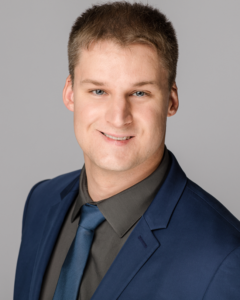Master’s Degree
Master of Science in Medical Physics: Gain Mastery at VU
Whether you’re interested in providing radiation therapy to cancer patients or diving into diagnostic imaging physics, our Master of Science in Medical Physics (MSMP) is a great place to begin your journey:
- 200+ hours of hands-on practical training to prepare you for residency
- Rigorous coursework to build a strong foundation of theoretical knowledge
- Diverse options for research exploration and mentorship
Our unique MSMP curriculum sets the foundation you need to excel in residency, on your board-certification exams, in your future clinical practice, or in your future academic pursuits.
Coursework: Laying the Foundations
Your two years of MSMP coursework are the theoretical groundwork for your future career.
- Complete five semesters of challenging coursework. Your first year will include coursework relevant to both diagnostic imaging and radiation therapy tracks, but your second-year courses will specialize further based on the track you choose.
- Thrive in our small-group learning environments. Because of our small program size, most of your classes will include 3 to 6 students, so you’ll have plenty of opportunity for one-on-one instruction and direct feedback.
- Collaborate with students and faculty from both therapy and imaging tracks.
- Learn from the interdisciplinary expertise of our experienced faculty.
Practicum: Hands-on Clinic Work
Though the MSMP centers on coursework, clinical experience remains crucial to this step of your medical physics training.
Whether you’re shadowing a radiologist, running quality assurance, or learning to operate the latest of radiation-producing technology, you’ll be involved in clinical settings from Day 1.
Over the course of your two years here, you’ll complete 200+ hours of clinical practicum, and your responsibilities will gradually build so that, by the end of Year 2, you’ll be equipped to perform residency-level tasks.
- Work with the wide variety of state-of-the-art diagnostic and radiation therapy equipment available at VUMC
- Verify personal treatment plans for various patients
- Discuss new techniques, like online adaptive radiation therapy and radiosurgery
- Get involved in the daily quality assurance around our medical center
- See firsthand what day-to-day life looks like as a radiation therapy or diagnostic imaging resident
Throughout your practicum hours, our expert faculty will be providing guidance, direct feedback, and support each step of the way.
Meet Shane
 Shane Welsh is a second-year student in the therapeutic Master of Science in Medical Physics program. He’s applying skills he used as a radiological control technician for the Department of Energy to new principles and technologies in medical physics.
Shane Welsh is a second-year student in the therapeutic Master of Science in Medical Physics program. He’s applying skills he used as a radiological control technician for the Department of Energy to new principles and technologies in medical physics.
“It’s important to look for a place that doesn’t just teach you the didactics but takes a more holistic approach of like how medical physicists can be a part of the radiation oncology department as a whole,” Welsh said. “You have therapists, the oncologists, the dosimetrists, you have medical physicists… That’s something that I have enjoyed about my education here. It’s not solely focused on the didactics but focused on the bigger picture teamwork – how medical physicists can benefit their radiation oncology departments. That interprofessional learning is important to consider in a program and something I have enjoyed about my experience at Vanderbilt.”
Research: Produce New Knowledge in Your Field
As a medical physicist, other professionals in your space will look to you as an innovator for diagnostic imaging technology and or for radiotherapy treatment delivery in the medical field. Research experience in grad school is a great place to start.
In our optional thesis pathway, you can:
- Gain exposure to the breadth of medical physics research
- Develop a close working relationship with an expert faculty member as your research adviser
- Stay on the cutting-edge of medical physics by further exploring developing technologies and treatments
- Learn to manage your time and work independently on your research thesis
- Gain interdisciplinary scientific experience working with faculty and students involved in related research
- Learn the foundation of scientific writing and prepare a research paper summarizing your work to submit to a conference or journal
- Discern whether pursuing an independent research PhD in medical physics might be the right next step for you.
Even if you’re fully committed to a clinic-based career, our research thesis option will help you develop experience with innovative technologies and learn time-management skills crucial for working independently.
What’s Next?
After completing an MSMP in radiation therapy or diagnostic imaging, you’ll be equipped to:
Apply to residency for your final two years of clinical training
Academic medical centers across the country offer various residency programs for radiation therapy and diagnostic imaging— including a radiation therapy residency right here at Vanderbilt.
Pursue a Ph.D. in medical physics or closely-related field for a research- or academic-oriented career.
Historically, some of our MSMP students have continued graduate study by joining the Vanderbilt University Physics Ph.D. program and developing a dissertation on a medical physics topic.
Complete the first part of the 3-part American Board of Radiology (ABR) certification exam:
- Part 1: a computer-based exam generally taken immediately after completing your MSMP graduate coursework
- Part 2: a computer-based exam focusing on specialty-specific knowledge in your discipline (i.e., radiation therapy or diagnostic imaging), generally taken near the end of your residency
- Part 3: an oral exam covering the same knowledge base as Part 2, generally taken after completion of your residency
